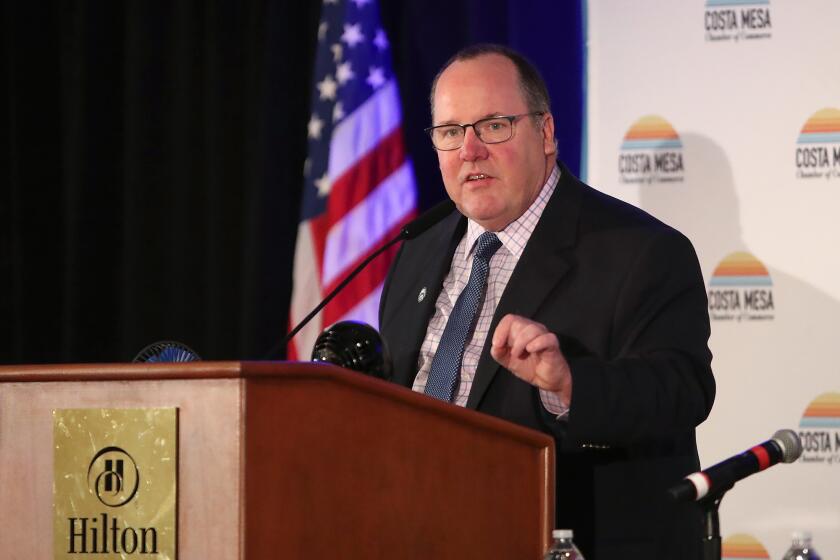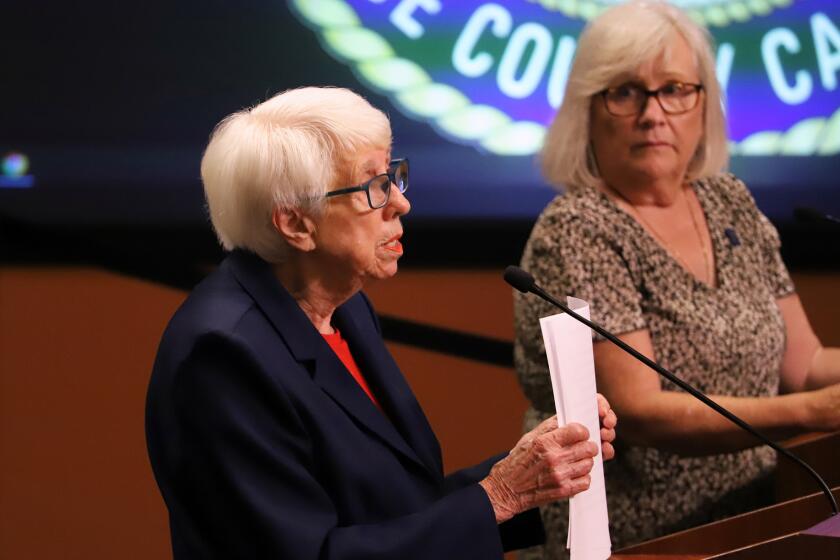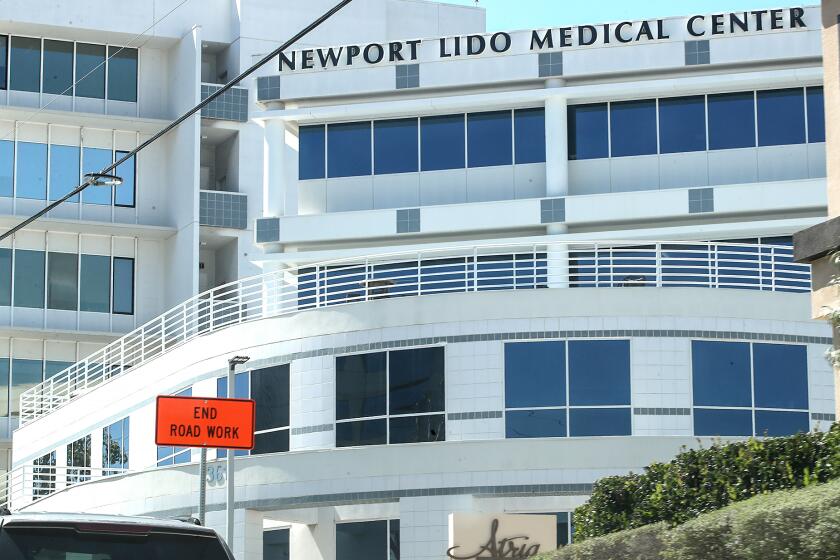Council cleared in lawsuit
A Superior Court judge ruled Wednesday that the Huntington Beach
City Council did not overstep its bounds when it put off a vote that
could divide the city into five council districts until March 2004.
The suit was filed by Huntington Beach resident Joseph Jeffrey
last week in an attempt to overturn the council’s decision to have a
ballot measure that would divide the city into five city council
districts and eliminate two council positions placed on the March
2004 ballot, rather than the upcoming November ballot.
‘I’m very upset that the judge ruled as he did,” Jeffrey said.
“I feel that 22,000 voters are not being given the opportunity to
vote for, or against, the initiative. We’re working on an appeal.”
Jeffrey said Judge Dennis Sheldon Choate boiled the lawsuit down
to whether or not the city had the discretion to set the vote for
March 2004. The judge ruled that it did and said he didn’t see
anything wrong with setting the vote for 2004, Jeffrey said.
Council members were delighted that the issue will wait until
March 2004 to go before voters.
“Obviously we’re pleased,” said Councilman Ralph Bauer. “Luckily a
judge saw the value of the prerogative of the council and agreed with
[us].”
Although the suit came as a surprise to Bauer, several of his
fellow council members said they anticipated the opposition.
“I was expecting someone to do it,” said Mayor Debbie Cook, who
was the only council member to vote against the delay.
Council members as a whole said they felt that they, and the
public, needed more time to look at the issue.
Councilwoman Connie Boardman said she voted to put the measure off
because she felt that there were many unanswered questions. Despite
her vote, the suit did not come as a shock to her.
“The people pushing the initiative have spent $100,000 so I wasn’t
surprised,” she said.
Jeffrey, a supporter and signature gatherer of the districting
measure, contended that the council’s decision to put the measure off
for a year-and-a-half was illegal. Supporters of the measure got
22,000 signatures, more than the required amount to have it placed on
the November ballot, and he argued that the council is preventing
city residents from voting on the measure in a timely manner.
-- Jose Paul Corona
Council candidates ready for November race
With four open seats, no incumbents, 18 candidates and a field of
contenders rife with both business advocates and environmental
activists, the race for the Huntington Beach City Council is on.
The closest thing to incumbents voters have to chose from this
November are a former Huntington Beach mayor, a former Hawaiian
Gardens mayor and the wife of a current City Council member.
Former Surf City Mayor Dave Sullivan, who served from 1992 to 2000
has thrown his hat into the ring, saying the city lacks fiscal
responsibility these days.
Kathleen Mello-Navejas has only lived in Huntington Beach for a 1
1/2 years, but she feels that her four terms as mayor of Hawaiian
Gardens will help her if she is elected to the City Council.
“I have a world of experience and talent,” she said. “I just felt
that I could use my leadership for giving back to the community.”
Just as the candidates divide themselves by their stance on
certain issues, generally, so do voters. Although the two do meet,
the Surf City camps traditionally split with the environmental versus
the development crowds.
There is a handful of candidates who put environmental issues,
such as saving the Bolsa Chica and cleaning up the beaches at the top
of their lists.
There’s no doubt about which camp some of the candidates sit in --
activist Joey Racano for instance, or Cathy Green, a founding member
of Amigos de Bolsa Chica, are pro-environment. Green, wife of
Councilman Peter Green, has lived in the city for 32 years. Her name
is on the long list of those named Outstanding Citizen; it was added
in 1998.
Racano has been very vocal in his opinions of the current council,
despite its environmental bent of the last couple of years.
“The city’s been run terribly. The polluted ocean and bad
infrastructure speak volumes,” he said.
Another candidate who lists Bolsa Chica high on her list is
Planning Commissioner Jill Hardy, a teacher at Huntington Beach High
School. Hardy was one of 36 applicants for the council seat vacated
by Dave Garofalo in December.
Fellow teacher Diane Lenning, a 2000 council candidate and 2002
applicant, puts beaches up the top of her list, as does 15-year
resident Conrad Jim Moreno; Steve Ray, who has served on the
Huntington Beach Citizens Participation Board; and Keith Bohr, a
former assistant project manager for the city. Bohr, however, also
says a focus needs to be on helping the local economy grow.
Moreno and Bohr applied for the job in January.
The candidates who hope to give local business owners a stronger
presence and promote business development are plentiful this race.
One such candidate is 2000 hopeful J. Devin Dwyer, who has been
endorsed by Congressman Dana Rohrabacher and by Orange County
Supervisor Jim Silva.
Joseph J. Carchio, who ran in 2000, also lists himself as a strong
advocate for small business owners in the city.
Stephen Garcia, a 16-year Surf City resident, also counts
redevelopment and the city’s infrastructure as two major issues in
his campaign. He has served on the Citizens Participation Advisory
Board for the past five years. He also ran unsuccessfully two years
ago. Norm Westwell has also run for City Council before and he’s
currently running for a seat on the board of the Ocean View School
District.
Don Hansen, 30, a strong presence in the south east section of
Huntington Beach, is making his first run for office as is Peter G.
Albini, who works for an electrical consulting firm. Another
candidate is former Huntington Beach Police Department officer Gil
Coerper. Two more little-known candidates are Jennifer Legg and
Robert Lillis who says his management experience is something that
the city is sorely lacking.
In the race for city attorney the field is small but fierce.
Deputy City Atty. Jennifer McGrath has stated her intentions and is
hoping to fill the opening left by her boss, City Atty. Gail Hutton.
Former Independent columnist Ron Davis, who has done legal work for
the city in the last year and ran against Hutton in 1998, is also
interested.
Fed up with the money spent on outside attorneys, civil attorney
Benjamin Pugh joined the race. Lastly, Alan Leigh Armstrong, as
26-year resident hopes to keep the city out of litigation by writing
easy to understand statutes and contracts.
-- Jose Paul Corona
Surf City beaches cleaner than ever
Surf City has an image problem.
Huntington Beach’s shoreline, which has taken its lumps in the
media for a rash of bacteria outbreaks, is cleaner than it has ever
been, a UC Irvine study concludes.
“I think there’s a positive environmental message here,” said
Stanley Grant, the report’s lead author. “There’s been a lot of money
spent over the years on mitigation, and we can clearly see the
impacts of that.”
In the report, published last week on the Web site of the American
Chemical Society’s journal, Grant surveyed water-quality data from
1958 to 2001. The Orange County Sanitation District and Orange County
Health Care Agency provided the data.
One of his findings in the report was that water quality improved
dramatically after the sanitation district replaced its outfall pipe
in 1971. The district releases 234-million gallons of sewage per day
from a pipe 4 1/2 miles out to sea.
Before 1971, the district released its sewage only a mile
offshore.
Grant, who chairs the school’s Department of Chemical Engineering
and Materials Science, also questioned the validity of current
water-quality testing methods. When county health regulators warn
swimmers away from Huntington State Beach, they’re using data that’s
almost 24 hours old, leaving open the possibility that the bacteria
levels have already returned to more appropriate levels, Grant said.
The beach, Grant said, could already be clean when the sign is poked
into the sand.
“You’d have to have a stoplight up on the beach flashing green and
red,” Grant said. “It flashes red, and everybody would have to run
out of the surf. It flashes green, and everybody could run back in.”
The county’s regulators applauded the analysis as food for
thought. Larry Honeybourne, a spokesman for the Health Care Agency’s
environmental health division, said Grant’s study presented the data
in a unique way.
The report also pointed to a series of unexplained “hot spots” for
bacteria outbreaks at the city’s state beaches.
“Huntington State Beach is an area [where] we have had
intermittent postings,” Honeybourne said. “It is a location that
tends to have higher bacteria counts.”
-- Paul Clinton
UCI scientist gets $640,000 for study
A team of researchers at UC Irvine has been given funds to launch
a statewide water-quality study.
Led by noted scientist and lecturer Stanley Grant, who teaches
environmental engineering in the school’s Chemical Engineering and
Materials Science Department, the researchers are looking into what
role wetlands play in ocean pollution.
“We’ve known for some time that coastal wetlands are a critical
habitat for rare and endangered species,” Grant said. “The issue is
whether animal feces released from coastal wetlands are contributing
to beach closings in Southern California.”
The UC Office of the President handed Grant and his team $640,000
to complete the study.
UCI environmental engineer Brett Sanders, oceanographer Clinton
Winant and biological oceanographer Lisa Levin of the Scripps
Institution of Oceanography have said they will work with Grant
during the study.
Researchers said the study was needed to help uncover answers to a
persistent and enigmatic trend of postings and closures at beaches
that are caused by elevated bacteria levels in the water.
The group will study the Back Bay, Newport Harbor, the Santa Ana
River sloughs, Tijuana Estuary, San Diego Bay, Mission Bay, San
Dieguito Lagoon, the Ballona wetlands and the Mugu Lagoon.
Scientists have theorized that the bacterial outbreaks could
likely be caused by urban runoff, a polluted stew of animal waste,
human waste, pesticides and copper residue from car brakes that
washes off roadways.
In research done in a summer 2001 study, Grant and Sanders found
that bird droppings in Talbert Marsh contributed fecal matter to the
coastline off Huntington Beach.
“We want to know if our results from Talbert Marsh are unique to
that location or if this is a more widespread problem,” Sanders said.
--Paul Clinton
Warnings posted at State Beach
County health regulators on Tuesday warned swimmers to stay out of
the surf at Huntington State Beach near Magnolia Street.
The Orange County Health Care Agency announced the posting in a
news release at 4:30 p.m. Tuesday. Warnings were in place in the sand
stretching 500 feet in either direction of Magnolia Street.
Health agency officials detected elevated levels of bacteria in
the water off the beach, triggering the posting.
The beach at Magnolia is notorious for its outbreaks of bacteria,
the cause of which are still largely unknown. Polluted urban runoff
and bird and animal waste are thought to be the leading possible
causes.
Warning signs will remain at the beach until follow-up water
testing shows bacteria levels have returned to acceptable levels.
--Paul Clinton
All the latest on Orange County from Orange County.
Get our free TimesOC newsletter.
You may occasionally receive promotional content from the Daily Pilot.



